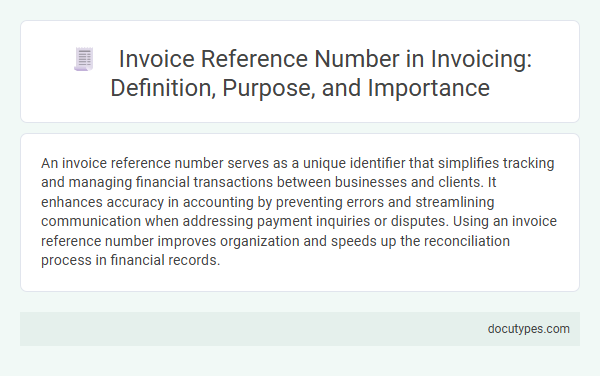An invoice reference number serves as a unique identifier that simplifies tracking and managing financial transactions between businesses and clients. It enhances accuracy in accounting by preventing errors and streamlining communication when addressing payment inquiries or disputes. Using an invoice reference number improves organization and speeds up the reconciliation process in financial records.
What is an Invoice Reference Number?
An invoice reference number is a unique identifier assigned to each invoice. It helps track and manage financial transactions efficiently.
- Identification - An invoice reference number distinguishes each invoice from others in accounting systems.
- Tracking - It enables you to quickly locate and verify specific invoices during audits or reviews.
- Communication - This number simplifies correspondence between businesses and clients regarding payments or disputes.
Key Elements of an Invoice Reference Number
An invoice reference number uniquely identifies each transaction for efficient tracking and record-keeping. It ensures accuracy in payment processing and helps resolve disputes swiftly.
- Uniqueness - Each invoice reference number must be distinct to prevent confusion between multiple transactions.
- Format Consistency - A standardized format simplifies data entry and retrieval across accounting systems.
- Traceability - The reference number links the invoice to related documents like purchase orders or payment receipts, allowing you to verify transactions easily.
Why Invoice Reference Numbers Matter in Business
| What Is the Purpose of an Invoice Reference Number? |
|---|
| An invoice reference number is a unique identifier assigned to each invoice. It is essential for tracking and managing financial transactions accurately. This number simplifies record-keeping, enabling quick retrieval of specific invoices during audits or payment verification. |
| Why Invoice Reference Numbers Matter in Business |
| Invoice reference numbers improve organization by distinguishing each transaction clearly. They reduce errors by preventing confusion between similar invoices, supporting efficient accounts payable and receivable processes. For businesses, these numbers enhance communication with clients and vendors by providing a precise reference for payment inquiries. Your ability to monitor outstanding invoices and ensure timely payments depends heavily on consistent use of reference numbers. They streamline financial reporting and contribute to smoother cash flow management in any business operation. |
The Role of Invoice Reference Numbers in Tracking Payments
What is the purpose of an invoice reference number? An invoice reference number uniquely identifies each transaction, making it easier to track payments accurately. This code helps both businesses and customers verify payment status and resolve discrepancies quickly.
How to Generate an Effective Invoice Reference Number
An invoice reference number serves as a unique identifier that simplifies tracking and managing invoices. Generating an effective invoice reference number involves combining elements such as the date, client code, and sequential numbering to ensure uniqueness. Using consistent formats improves accuracy in record-keeping and streamlines communication between businesses and clients.
Invoice Reference Numbers and Compliance Requirements
An invoice reference number uniquely identifies each transaction, streamlining record-keeping and payment processing. This number ensures accuracy and traceability in financial documents for both parties involved.
Invoice reference numbers play a crucial role in meeting compliance requirements by providing a clear audit trail for tax authorities and regulatory bodies. Your ability to track and verify transactions reduces the risk of errors and fraudulent activities. Maintaining consistent invoice reference numbers supports transparency and adherence to accounting standards.
Common Formats for Invoice Reference Numbers
An invoice reference number serves as a unique identifier that helps businesses track and manage their invoices efficiently. Common formats include sequential numbering, alphanumeric codes combining letters and numbers, and date-based references that incorporate the invoice date. These formats enhance accuracy in record-keeping and simplify payment reconciliation between vendors and clients.
Preventing Fraud with Unique Invoice Reference Numbers
An invoice reference number serves as a unique identifier for each transaction, ensuring precise tracking and record-keeping. Companies rely on these numbers to differentiate between multiple invoices, reducing confusion and errors.
Preventing fraud is a key purpose of unique invoice reference numbers, as they enable verification of authentic documents. Your business can easily detect and reject duplicate or altered invoices, strengthening financial security and trust.
Best Practices for Managing Invoice Reference Numbers
An invoice reference number uniquely identifies each transaction, streamlining tracking and payment processes. Clear management of these numbers prevents errors and supports efficient financial record-keeping.
- Consistency - Use a uniform format for all invoice reference numbers to avoid confusion and simplify retrieval.
- Uniqueness - Ensure every invoice has a distinct reference number to eliminate duplication and enhance audit accuracy.
- Centralized Tracking - Maintain a dedicated system or log for recording all invoice reference numbers to improve access and monitoring.
Your adherence to these best practices strengthens invoice management and promotes accurate financial operations.
What Is the Purpose of an Invoice Reference Number? Infographic

